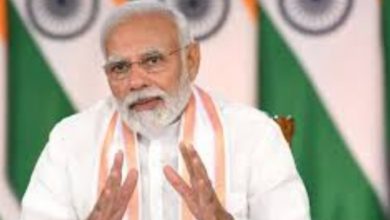Manchin dangles hopes of a future compromise, Democrats revolt

It was a familiar, if excruciating, position for Democrats.
A day after pulling the plug on his party’s plans to pass a climate, energy and tax package this summer, Sen. Joe Manchin of West Virginia, the conservative-leaning Democrat who has repeatedly flirted with compromise only to scuttle his party’s highest ambitions, called in Friday to a West Virginia radio show. Perhaps, he suggested, in another month or so, he might see his way clear to salvaging the last bits of President Joe Biden’s domestic agenda.
There was no guarantee, of course, and the comments were only the latest instance of Manchin capitalizing on his role as a swing vote in an evenly divided Senate to dictate his party’s legislative strategy, leaving Democrats at his mercy.
This time, Democrats had had enough.
Rather than engage in another round of will-he-or-won’t-he negotiations with Manchin, Biden let it be known that he was done trying to secure his climate agenda in Congress.
Manchin’s abrupt withdrawal left Sen. Chuck Schumer, D-N.Y., the majority leader, jilted after months of courting a colleague whose demands and red lines seemed to shift the day, or the latest economic projection. And it prodded many Democrats into open revolt against Manchin, blaming him for the demise of their ambitions and the last chance for their party to tackle the exential threat of climate change.
Manchin, said Rep. Pramila Jayapal of Washington, chair of the Congressional Progressive Caucus, “has shown that he doesn’t know how to close a deal — or he doesn’t want to close a deal — and that you can’t trust him.”
For more than a year, Manchin, who at 74 is serving his third term in the Senate, has been situated exactly where he prefers to be: at the center of a high-stakes political and policy negotiation, with attention and speculation focused on him.
Democrats have toiled to win his vote on any piece of their once-ambitious domestic agenda, tailoring their policy moves so as not to alienate him. They have contorted themselves to suit his often-changing dictates and have scaled back their ambitions repeatedly to stay within his red lines, but they have so far come away empty-handed on their biggest priorities.
Because of Democrats’ razor-thin margin of control in the 50-50 Senate and unified Republican opposition to most of their agenda, Manchin has effective veto power over the party’s legislative strategy — and has exercised it often and unapologetically.
But while Biden and congressional Democrats have pushed for transformative policies to confront generational challenges such as climate change, Manchin, who channels the desires of his very conservative, coal-and-gas-producing state, has focused on nearer-term issues.
On Friday, he said he had told party leaders he wanted to wait another month — until inflation numbers for July were released — before he could decide on whether to act on climate change.
“I am where I have been — I would not put my staff through this, I would not put myself through this if I wasn’t sincere about trying to find a pathway forward to do something that’s good for our country,” Manchin said Friday in the interview with radio host Hoppy Kercheval. “They cannot come to grips because I have a ‘D’ my name or someone has an ‘R’ their name, we should do whatever one side wants. That’s not me.”
Biden made no mention of Manchin in a statement issued Friday. Asked at a news conference in Jiddah, Saudi Arabia, whether the West Virginian had been negotiating in good faith, the president demurred, saying he was not the one who had been negotiating with him.
But angry congressional Democrats pinned their frustration on the West Virginia Democrat. One, Sen. Martin Heinrich of New Mexico, mused publicly about whether Manchin deserved his chairmanship of the Committee on Energy and Natural Resources.
“It’s been a really, really terrible day,” Sen. Tina Smith, D-Minn., a key champion of the climate provisions, said in an interview. “If Sen. Manchin wants a deal on climate and energy, he can have one in a heartbeat. This is Sen. Manchin’s deal for the taking, and if it doesn’t happen, it is on him.”
On Capitol Hill, Manchin is something of a unicorn — the only national Democrat from his ru-red state — and acts and votes accordingly. Set to face voters in 2024, he is unlikely to be threatened a primary challenger in a state former President Donald Trump won nearly 40 points in 2020.
That has given Manchin leverage to accomplish his own policy goals — including holding firm against moving entirely away from oil and gas — and res what he considers his party’s lurch toward its liberal base. He appears happiest when he is in the middle of a consequential policy negotiation; he has been wined and dined as a crucial participant in bipartisan talks, invited to Biden’s Wilmington, Delaware, home for breakfast and pursued the White House officials, lawmakers, aides and reporters who dissect his every syllable for a kernel of insight.
But the murkiness, and at times inconsency, of Manchin’s positions has increasingly grated on his Democratic colleagues.
Barely three months into the Biden adminration, he prompted the longest open vote in modern Senate hory raising a last-minute objection to the size of unemployment benefits in the $1.9 trillion pandemic aid plan. Democrats had to slash the jobless payments to win his vote, which cemented passage of the package.
He refused to help Democrats change filibuster rules to enact voting rights legislation, killing the effort even after Schumer gave him the lead role in writing an alternative bill to ensure he would support it.
But on no issue has Manchin bedeviled Democrats more than on their ambitious social safety net, climate and tax package. To win his vote to begin work on the plan, Schumer signed on to a secret memo with Manchin that made clear that the West Virginian had no intention of accepting the $3.5 trillion in spending envisioned in Democrats’ budget. The document outlined Manchin’s much narrower parameters for a $1.5 trillion package, including income thresholds for social programs and accommodations for fossil fuel tax credits and natural gas.
“I will try to dissuade Joe on many of these,” Schumer scrawled on the document, which enraged many Democrats when it became public. He never could. Six months later, Manchin abruptly walked away from talks on the package.
Democrats regrouped in January and began efforts to rebuild their shattered plan, adhering strictly to the components Manchin had repeatedly laid out: paying down the national debt, overhauling parts of the tax code and lowering the cost of prescription drugs allowing Medicare to negotiate prices and some spending.
early this month, Senate Democrats had begun rolling out pieces of a package they believed could win Manchin’s support, including a drug pricing proposal and a plan to shore up the solvency of a key Medicare program increasing taxes for some high-earning Americans.
But Thursday evening, after news that prices had surged 9.1% in the year ending in June, Manchin balked again, telling Schumer that he wanted to wait on any climate or tax proposals until seeing inflation figures for July. Should Democrats ins on pushing forward with legislative action before then, Manchin said, they should act only on proposals aimed at lowering the cost of prescription drugs and extending expanded Affordable Care Act subsidies.
“Let’s wait until that comes out, so we know that we’re going down the path it won’t be inflammatory, to add more to inflation,” Manchin said in the radio interview. Recounting Schumer’s response, Manchin added: “I said, ‘Chuck, it’s wrong. It’s not prudent to do the other right now.’”
“I want climate. I want an energy policy,” he said, adding, “I thought we were moving truly in the right direction.”
But Schumer appeared to have grown exasperated and convinced that Manchin’s vote was not obtainable. One official said that Manchin had rebuffed major concessions that would have enraged progressive Democrats, including adding more drilling measures, removing a key electric vehicle tax credit and dropping tax increases he had resed.
Manchin’s stance effectively scuttled the chances of action in the coming days on a critical priority for Democrats and strongly suggested that unless they abandoned the climate and tax proposals altogether, they might not salvage any of their domestic policy package before the midterm congressional elections in November. In September, after a five-week planned recess, lawmakers will have only a limited window to act on the package. And they are eager to give themselves as much time as possible to campaign on whatever they pass before the November elections.
Bearing political scars from a year of fractious talks, few Democrats on Friday seemed willing to gamble that there was a larger deal to be had in September.
“I can’t get blood from a stone,” said Rep. Elissa Slotkin, D-Mich., who is facing reelection in a competitive drict. “I’m not in the Senate. They’re clearly having problems negotiating among themselves. And I will just — for my constituents — take what I can get.”





